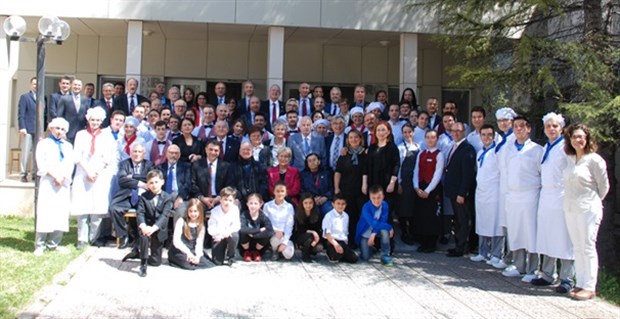 April 3 is the birthday of Bilkent University’s founder, Prof. İhsan Doğramacı. Each year, the university community celebrates the occasion as Bilkent Day, with events including a luncheon, the annual Bilkent Day Conference and a commemorative concert. The year 2016 marks the 101st anniversary of Prof. Doğramacı’s birth.
April 3 is the birthday of Bilkent University’s founder, Prof. İhsan Doğramacı. Each year, the university community celebrates the occasion as Bilkent Day, with events including a luncheon, the annual Bilkent Day Conference and a commemorative concert. The year 2016 marks the 101st anniversary of Prof. Doğramacı’s birth.
As has become customary, this year’s celebration began with the luncheon. Because April 3 fell on Sunday, the luncheon took place on the preceding Friday, April 1. The School of Applied Technology and Management hosted the event at its practice restaurant, Le Piment Rouge, where students of the Department of Tourism and Hotel Management prepared and served the meal under the supervision of Chef Barış Ak and Service Instructor Ali Ünal.
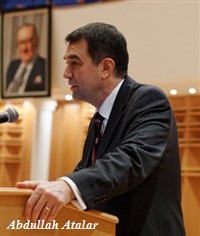 In honor of Prof. Doğramacı, the luncheon featured dishes in the style of Erbil, his birthplace. Among the guests were the Doğramacı family and members of the university administration. A special feature of this year’s luncheon was a surprise appearance by BLIS Primary School students, who sang a song dedicated to Prof. Doğramacı, receiving warm applause from the guests.
In honor of Prof. Doğramacı, the luncheon featured dishes in the style of Erbil, his birthplace. Among the guests were the Doğramacı family and members of the university administration. A special feature of this year’s luncheon was a surprise appearance by BLIS Primary School students, who sang a song dedicated to Prof. Doğramacı, receiving warm applause from the guests.
The celebration then continued on Sunday afternoon with the 2016 Bilkent Day Conference, held at the Bilkent Concert Hall. The program opened with a presentation by Bilkent’s rector, Prof. Abdullah Atalar, on “The State of the University.”
In his presentation, Rector Atalar highlighted the academic, educational and research accomplishments of Bilkent University. The information he shared included statistical and other data concerning the student body, university alumni, faculty members, research at Bilkent, the library, university budget items, and world university rankings. Rector Atalar also spoke briefly about future investments and plans. 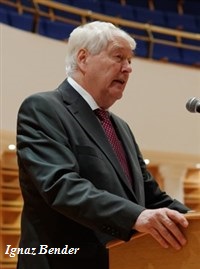
The remaining portion of the program consisted of talks by two invited outside speakers. The first of these was given by Dr. Ignaz Bender, president of the International Conference on Higher Education. The ICHE is an annual, worldwide meeting that was initiated by Prof. Doğramacı to bring together, in Dr. Bender’s words, “heads of universities and experts in higher education to contribute to better university governance.”
Dr. Bender began his talk, titled “Suggestions for Fostering ‘Peace on Earth,’” by paying tribute to Prof. Doğramacı, whom he referred to as a “universal man” (homo universalis). “He was an outstanding scientist and a world-renowned higher education expert. His knowledge of many languages opened to him the hearts of people around the world and granted him influence in international organizations.”
Dr. Bender also recounted his memories of Prof. Doğramacı in his role as founder, president and for many years honorary president of the ICHE. “He attended almost all the ICHE conferences, in North America, Europe and Asia. His brilliant opening speeches—often before heads of state or prime ministers—his keynote addresses, written papers, and comments were always original, essential and helpful. At every conference he was the first participant to show up in the morning.”
Turning his focus from Bilkent University’s founder to the institution he had founded, Dr. Bender read out the opening portion of its mission statement: “Bilkent University was founded to provide an environment for learning and intellectual growth encompassing the sciences, technology, humanities and the arts, to serve human welfare and to foster peace on earth.”
Dr. Bender then shared his ideas on how human welfare and peace on earth might be fostered in today’s world, first noting how, despite humankind’s remarkable technological development, “we are extremely underdeveloped in the field of global peace, of agreed principles of law, of accepted global respect for human rights.” He expressed his belief that the way to remedy this situation is for all nations to agree to give up a minimum amount of their sovereignty in order to implement a “world constitution.”
After outlining how this might come about, Dr. Bender described the character of such a constitution, which, he said, “should first of all define the principles under which we want to live on this globe.” He enumerated these principles as “respect for human rights, the sovereignty of the citizens as the basis of political power, the rule of law, the independence of the judiciary including a world constitutional court, the division of power between the legislative, executive, and judicial branches, and the principle of subsidiarity and solidarity.”
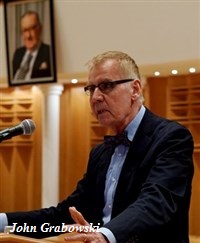 Following Dr. Bender’s remarks, John Grabowski, Krieger–Mueller Professor of History at Case Western Reserve University, took the podium. In his talk, titled “İhsan Doğramacı and the History of an Idea,” Dr. Grabowski related the story of “the idea that became Bilkent”—a story that, he said, “began in Erbil in 1915 with the birth of the man we remember and honor today.”
Following Dr. Bender’s remarks, John Grabowski, Krieger–Mueller Professor of History at Case Western Reserve University, took the podium. In his talk, titled “İhsan Doğramacı and the History of an Idea,” Dr. Grabowski related the story of “the idea that became Bilkent”—a story that, he said, “began in Erbil in 1915 with the birth of the man we remember and honor today.”
Noting that Prof. Doğramacı’s “remarkable life” intersected with many major events of the twentieth century both in Turkey and globally, Dr. Grabowski suggested that “these events shaped his perspectives, and his extraordinary curiosity, persistence and intelligence allowed him to harvest information from these intersections and synthesize it into new concepts and institutions.”
Dr. Grabowski then went on to discuss the numerous innovations that Prof. Doğramacı introduced to Turkey’s health care and higher education systems—innovations that served as “foundation stones,” culminating in the creation of Bilkent as Turkey’s first private university. These included changing medical education in Turkey by replacing rote learning with a system of hands-on, in-practice training; the creation of a private foundation to support a children’s health clinic in a poor district of Ankara; the founding of Hacettepe University; and, what Dr. Grabowski called an important innovation in the history of foundations worldwide: the creation of Bilkent Holding as a group of industries and businesses whose profits would be used to support Bilkent University.
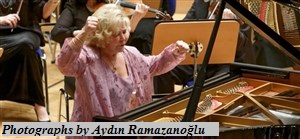
He concluded by referring to Prof. Doğramacı’s belief in the way an idea can have far-reaching effects, noting how true this has been in the case of the idea that became Bilkent. “Each of us has a spark of life and inspiration that we can transmit, and thus begin a chain reaction of sorts, as the spark multiplies with each subsequent personal interaction. The multiplication of that ‘spark’ was İhsan Doğramacı’s guiding principle. His idea, his spark has been transformative for thousands of students who have studied here since 1986 and for students at other Turkish universities that have emulated the Bilkent model….We and all who have worked and studied at Bilkent owe a great deal to Hocabey and to those who helped him make his idea a reality.”
The final event of this year’s Bilkent Day took place in the evening, with a special concert by the Bilkent Symphony Orchestra under the baton of Gürer Aykal. The first half of the program featured the Concerto for Piano in A minor by Edvard Grieg, with Gülsin Onay as soloist. Following an intermission, the BSO performed “Söyleşi” by Ferit Tüzün and “Dances of Galánta” by Zoltán Kodály.
